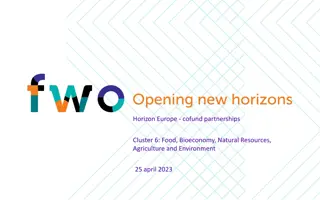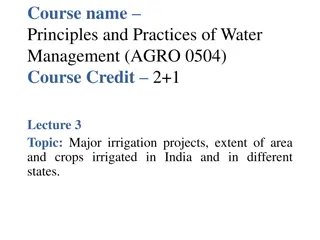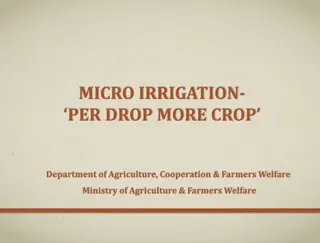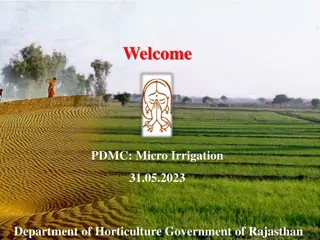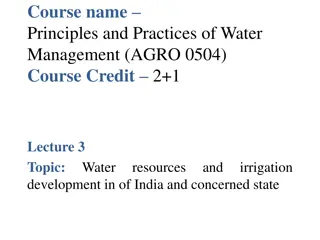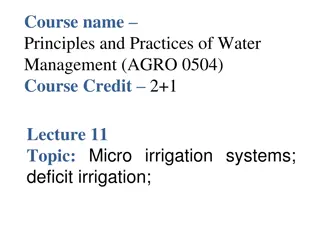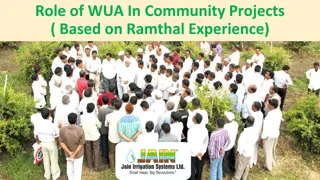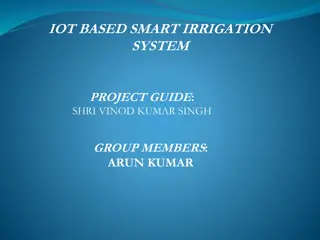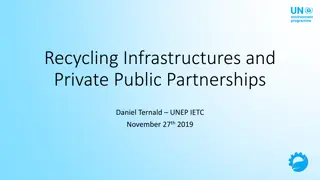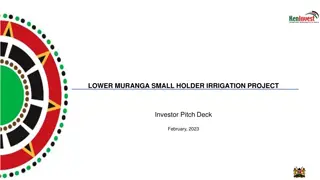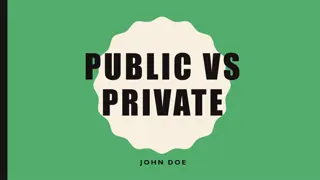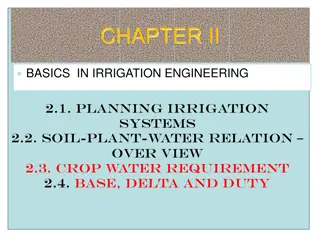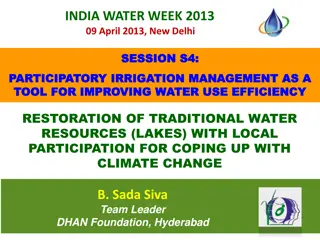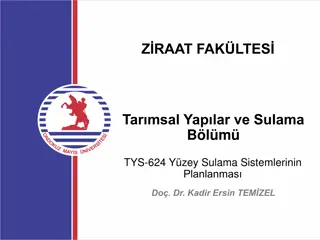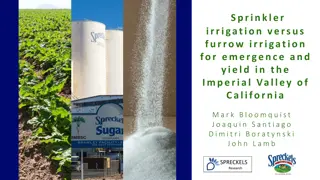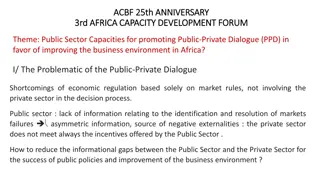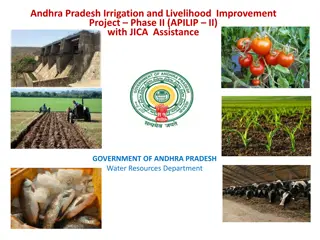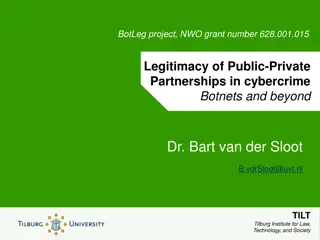Public-Private Partnerships for Irrigation Development Results
Outcomes of the AMPPIDA project presented in Tanzania, focusing on the role of PPPs in boosting agricultural income and stability. Discover insights on the effectiveness and complexities of irrigation PPPs, along with case studies like Kilombero Plantation Limited. Uncover findings regarding land tenure, price volatility, and taxation policies influencing the success of irrigation initiatives.
Download Presentation

Please find below an Image/Link to download the presentation.
The content on the website is provided AS IS for your information and personal use only. It may not be sold, licensed, or shared on other websites without obtaining consent from the author.If you encounter any issues during the download, it is possible that the publisher has removed the file from their server.
You are allowed to download the files provided on this website for personal or commercial use, subject to the condition that they are used lawfully. All files are the property of their respective owners.
The content on the website is provided AS IS for your information and personal use only. It may not be sold, licensed, or shared on other websites without obtaining consent from the author.
E N D
Presentation Transcript
Public-Private Partnerships for Irrigation Development: Results of the AMPPIDA project Faustin Maganga Presentation at Workshop on Policy and Investment Options for Irrigation Development in Tanzania Tuesday,26 June 2018 Uniting agriculture and nature for poverty reduction
Overview of PPPs for Irrigation High cost of irrigation development but growing demand for ag income, stability PPPs promoted by donors to mobilize resources from private sector: including financial, technical, and managerial resources What is the evidence on what works for PPPs? Irrigation PPPs more complicated than other PPPs Uniting agriculture and nature for poverty reduction
Overview of PPPs for Irrigation in Tanzania PPPs as response to National Irrigation Master Plan and low level of improved irrigation compared to estimated potential (<1%) Irrigation PPPs part of SAGCOT Private sector seen as a catalyst for new ideas and technologies so other farmers benefit from higher productivity and market access. Irrigation PPPs require more than irrigation: whole value chain Uniting agriculture and nature for poverty reduction
Case Studies Kilombero Plantation Limited (KPL) Case Madibira Smallholder Agricultural Development Project Rice Kilombero Sugar Crop Rice, maize Sugarcane Size 5818 ha (3,000 ha with irrigation) Irrigated core estate with unirrigated outgrowers 5,634 ha (3,000 with irrigation) Farmer cooperative 12,000 ha Modality Irrigated core estate with unirrigated outgrowers Uniting agriculture and nature for poverty reduction
KPL Findings Land tenure: Former state farm re-occupied, compensation to vacate, tensions with community Price volatility: company and farmers losing out Taxation policy on imported equipment Multiple viewpoints, realities , blame game Uniting agriculture and nature for poverty reduction
Netmapping Overall:Who influences Public Private Partnership for Irrigation in xxx? Links: Technical advice Funding Inputs Formal oversight Political/ social influences Power/Influence: How powerful is each actor over PPP in Irrigation Development in xxx? Uniting agriculture and nature for poverty reduction
Madibira Findings Smallholders relatively satisfied Scheme improved farmers income, housing and social services (health centers, primary and secondary schools) Challenges: Poor access roads Rice milling plant shut down due to unreliable energy Market unreliability Shortage of equipment (tractors, power tillers) Decrease of water for irrigation. Uniting agriculture and nature for poverty reduction
Madibira Net-Map Legend: Uniting agriculture and nature for poverty reduction
Kilombero Sugar Findings Smallholder producer associations are important in linking the investors and smallholders Associations provide essential agricultural services to their out-growers. Recently services expanded into cane harvesting, loan brokerage and administration, and extension support. Associations enabled out-growers to negotiate and transact collectively with miller, reducing transaction costs to both parties. They also negotiate with CRDB Bank and National Microfinance Bank Uniting agriculture and nature for poverty reduction
Kilombero Sugar Findings Challenges: Transparency on measurement of weight of sugarcane for each farmer Measurement of sucrose content which is done in closed laboratories of the nucleus farm Governance issues related to operations of the famer associations Uniting agriculture and nature for poverty reduction
Kilombero Sugar Net-Map Legend: Uniting agriculture and nature for poverty reduction
Tanzania Conclusions Few operating PPPs for irrigation Low demand from investors to develop new areas Hard enough to redevelop abandoned state farms Land already (supposed to be) available Only Madibira irrigates smallholder land PPPs focus on core estates, technical assistance to outgrowers Challenge to develop PPPP (Public Private Producer Partnerships) Higher smallholder satisfaction on Madibira More voice, accountability, irrigation service Uniting agriculture and nature for poverty reduction
Key Challenges Identified Address formal and informal land and water rights to ensure legitimacy and prevent resentment Need information on water availability and use (competing uses, climate change) Production, Processing, and Price risks Difficulty in aligning profit and development objectives Time: Needed to build trust, but time/cost tradeoffs
Investment implications Needs beyond irrigation infrastructure (technology, taxation, training, markets, inputs) Who bears cost of supporting smallholder development? Government? Private companies? Donors/Development partners? Smallholders? Institutional investment: Smallholder coops/Associations play important role in Madibira, Kilombero Sugar Recognize farmer associations as an investment
Comparative Structure Activity Authorization Govt KPL Farmers Govt MAMCOS Farmers + Donors Planning +Donors, +MFI Financing ADB loan Share capital System construction System operation System maintenance On-farm construction Technical advice Production Unirrigated Processing Marketing
STAMP4 Irrigation: Stakeholder Task Alignment Matrix for Irrigation
Bagamoyo Sample Commissioner of Other affected people Dt Ag Research and Mlingano Research Farmers in villages Environment NGO Research Institute Tropical Pest Bagomoyo Sugar Basin Water NIRC Natnl Irrig TZ Fertilizer Egyptian backer Min. of Land Agro-chemical Microfinance Sugar Board Ministry of Ministry of Village leaders Kibaha Sugar Research Ariculture Organization TBS/TFDA Authority Authority Outgrowers Consultant Irrigators' Institute Extension Contractor SAGCOT TANESCO suppliers Provider TANAPA Institute Commis Water NEMC Lands AFDB Bank NGO IFAD LGA TIC Activity Task C C A C C F, C C C C R F Feasability Assessments: Enviro and Social C C C F,C,A C R F C Soil and Water A C R I I I Land Rights (acquisition) A C, I Authorization C C R C Water Usage Permits A R C C,I R C Water Quality Financing Loan Contracts A C F R Headworks & nuclear farm Design R, F R C C On-farm irrigation (outgrowers) Land Clearing and Levelling R Construction System construction F R Capacity building for O&M Operation System operation R R Maintenance System maintenance (including drainage) R C C C C Water Use Monitoring Fee Collection R F R R R Advice on irrigation practices Technical Advice Advice on ag practices C R C,A Seedlings Inputs A A R Fertilizer, Other agrochemicals R Planting R Irrigating Production R R Weeding Harvesting A R Product (processing/packaging) Processing A R Quality assurance Marketing A R Marketing produce Construction On-farm works (outgrowers) Advice on irrigation practices Technical Advice (Outgrowers) R R R R R R Advice on ag practices (outgrow) Financing inputs Financing Production (Outgrowers) Seedlings Inputs (Outgrowers) Fertilizer, Other agrochemicals Planting Irrigating Production (Outgrowers) Weeding Harvesting Processing (Outgrowers) Product (processing/packaging) Quality assurance Marketing (Outgrowers)
Implications Sharing of costs, benefits, risks Is irrigation likely to be profitable for investors? For smallholders? Logic for state investment in irrigation as a public good, less for private sector. Beyond panaceas Need to engage with complexity Tools for understanding complex arrangements Range of options for PPP arrangements Many private sector options; Smallhoders as investors? Uniting agriculture and nature for poverty reduction


